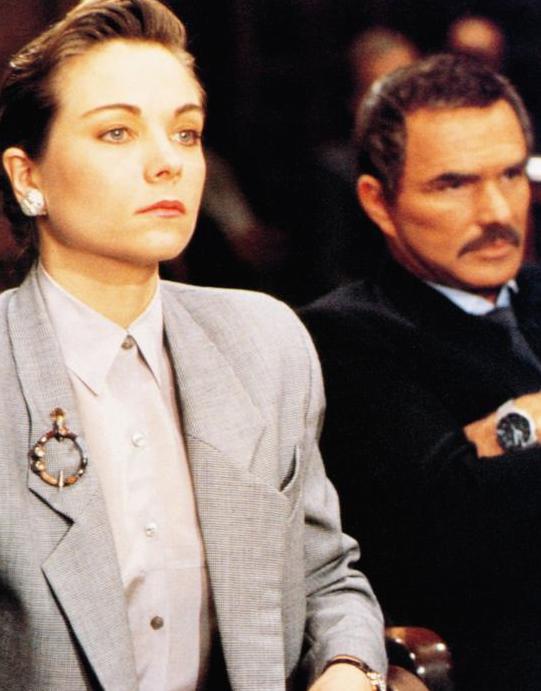Friday, January 27, 1989
PHYSICAL EVIDENCE. Written by Bill Phillips. Music by Henry Mancini. Directed by Michael Crichton. Running time: 99 minutes. Rated 14 Years Limited Admission with the B.C. Classifier’s warning: some violence, occasional very coarse language.
THE DECEASED WAS NOT a nice guy. Few mourned the passing of Boston businessman Jake Farley (Louis Negin), a nightclub owner heavily into prostitution, blackmail and drug dealing.
The accused is not the sort to grin and bear it. Ex-cop Joe Paris (Burt Reynolds), whose name was found on a note in the dead man's pocket, has a reputation for physical excess.
On suspension for throwing his own partner through a plate glass window, Paris was heard threatening Farley shortly before the murder. Investigators found a bloodied wire loop hidden in his messy apartment on the morning after.
The defence attorney is not afraid of tough guys or lost causes. "Be nice," arrogant, ambitious Jennifer Hudson (Theresa Russell) tells Paris. "Your ass is in my hands."
Her client, a veteran police detective, is unimpressed.
"This is me," the preppy public defender insists. "Guts and brains. You can't do any better."
A no-frills mystery-thriller, Physical Evidence does all right. Alternating street action with courtroom confrontations, the modern-dress drama represents both a challenge and a change for its director, best-selling novelist Michael Crichton.
His first feature assignment since the filmed-in-Vancouver techno-shocker Runaway, (1984), Physical Evidence has neither a science-fictional premise nor period trappings to divert our attention from the essential character relationships. Here, the characters are the story, and the stars the real show.
Reynolds, determined to re-establish himself as a serious actor, is in troubled tough-guy mode again. Recalling his performances in Heat (1986) and Malone (1987), he is sullen and subdued. When not beating up on the bad guys, his Joe Paris has the little-boy-lost quality that has, so far, failed to click with Reynolds's down-home fans.
Russell, best known for her incendiary presence in pictures like 1980’s Bad Timing: A Sensual Obsession and Black Widow (1987), lightens up to play an assertive, clothes-conscious career woman.
A former Peace Corps volunteer, her Jenny Hudson is the sort of woman who is careful to colour co-ordinate her causes with her fashion accessories.
As written by Bill Phillips, the drama is built on the growing attraction between these unlikely allies. Hudson suspects that her client may be guilty, while Paris doubts his lady lawyer has the savvy needed to win a murder case.
Had Paris seen 1985’s Suspect (in which Cher defends Liam Neeson), Jagged Edge (also 1985, with Glenn Close representing Jeff Bridges) or Legal Eagles (1986; Debra Winger pleading the case for Daryl Hannah), he might have been less apprehensive. Had we not seen all of them, we might have been less sure of exactly where this picture is headed.
Crichton's other major problem is that, capable as they are, his stars have virtually no interpersonal chemistry. A director with a preference for broad strokes and directly-told tales, he compensates by emphasizing the pulp plotting and standard thriller technique.
His Physical Evidence is a watchable if inconsequential urban adventure.
The above is a restored version of a Province review by Michael Walsh originally published in 1989. For additional information on this archived material, please visit my FAQ.
Afterword: The driven female attorney movie became its own subgenre in the late 1980s. In the above review, I also might have mentioned The Accused from 1988, the made-in-Vancouver feature in which Kelly McGillis seeks justice for Jodie Foster (an Oscar-winning role for Foster). Or 1989’s The Music Box, with Jessica Lange defending her father Armin Mueller, an accused war criminal. The subject deserved further study, and Kenyon College professor Ric Sheffield did just that in 1993, contributing a paper called On Film: A Social History of Women Lawyers in Popular Culture 1930-1990 to the Loyola of Los Angeles Entertainment Law Review.
Though I didn’t know it at the time, Michael Crichton’s Physical Evidence was supposed to have been the sequel to director Richard Marquand’s 1985 box-office success Jagged Edge, with Glenn Close reprising her role as San Francisco lawyer Teddy Barnes. A complex tale of studio politics resulted in an entirely different film, and Crichton's last directorial assignment. In my review of the picture, I said he had “a preference for broad strokes.” In 2014, his widow Sherri Alexander Crichton established “The Official Site of Michael Crichton” to honour his memory and archive his work. It is here that this quote appears:
“At the time I was directing, I felt that I was reacting against an emerging period of extremely aggressive directorial styles. The clearest example of that — he’s more muted now — is [Martin] Scorsese. All those very active camera movements drew attention to the fact that there was a person telling you the story in a specific way, and you were being asked to recognize how it was being told to you. I didn’t want to do that. I wanted to do a much more self-effacing directorial style.”
Behind the camera: The four Michael Crichton-directed features posted to the Reeling Back archive today include his 1978 medical thriller Coma, the 1979 historical adventure The Great Train Robbery, the 1981 media mystery Looker, and the 1989 courtroom drama Physical Evidence.
See also: Films written and directed by Michael Crichton currently in the Reeling Back archive include 1973’s Westworld and Runaway (1984). Films based on Crichton works include director Stephen Spielberg’s 1993 adaptation of Jurassic Park, and Richard Heffron’s Futureworld (1976).
